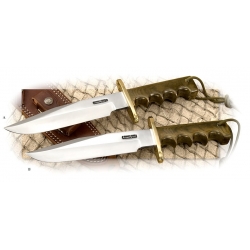

 The Accurate Reloading Forums
The Accurate Reloading Forums  THE ACCURATE RELOADING.COM FORUMS
THE ACCURATE RELOADING.COM FORUMS  Other Topics
Other Topics  Knives and Knife Making
Knives and Knife Making  Micarta
MicartaGo  | New  | Find  | Notify  | Tools  | Reply  |  |
| One of Us |
I have a pretty large piece-2.5"x12"x40". Is there a market for it? I don't know why I acquired it as I have no use for it. | ||
|
| One of Us |
What color? | |||
|
| One of Us |
An ugly green. | |||
|
| One of Us |
Green Micarta was made famous by Randall knives, especially for use on "combat" knives.  . | |||
|
| One of Us |
that ugly green is popular among some folks. Check the knifemakers / folder forum on baldeforums. http://www.bladeforums.com/ Todd Davison just sold one. http://www.bladeforums.com/for...Green-Canvas-Micarta | |||
|
| One of Us |
2.5 inches thick is pretty thick for knife scales. One could probably divide that in half. I'd see if I could find a knifemaker who would take it in partial trade toward a custom knife. | |||
|
| One of Us |
Lindy, That would be a good idea. I measured it to see if I guessed right. It is actually 2.5"X8.5"X48". | |||
|
| One of Us |
that's a lot of handles. I count 36 pairs | |||
|
| One of Us |
I guess the first question I'd ask is what is it made from? Paper, canvas or linen? We use the term micarta kind of like we use the term Kleenex to include all phenolic laminates. Micarta is however a registed trademark of Norplex-Micarta. Dave In 100 years who of us will care? An armed society is a polite society! Just because they say you are paranoid doesn't mean they are not out to get you. | |||
|
| One of Us |
I wouldn't have a clue and wouldn't know how to tell. | |||
|
| One of Us |
Sometimes it is pretty evident from a visual inspection. The paper is what is often used when there is a desire to have a "no grain effect." It can be shined up. The lines of course uses linen as the material and usually has a very "fine grained" look to it. It can also be shined but does show fine grain similar to a dense fine grained wood. The canvas has a more textured look and feel to it. It can be shined as well but is often just buffed or left rough for better grip. Cost for the same sized pieces run in that same order with paper the highest, linen the next highest and very close and lastly canvas at about half the cost of linens or even a little less. Hope this helps. Dave In 100 years who of us will care? An armed society is a polite society! Just because they say you are paranoid doesn't mean they are not out to get you. | |||
|
| One of Us |
I think this is natural canvas and white linen.  grain  | |||
|
| One of Us |
I guess that I need to post a photo. Mine doesn't look like that. | |||
|
| one of us |
Butch: Did you ever sell it? I accidentally ran on this post while reading on Blade Forums. Seems that there are only 2 REAL Micartas, because the name is trademarked. The original maker, Westinghouse, whose product is held in very high regard, and the company that then bought the name, Norplex, whose product, at least some of which is imported, is not so widely respected. So, technically much of what is called Micarta these days is probably not. This post is by a widely respected knifemaker:
xxxxxxxxxx When considering US based operations of guides/outfitters, check and see if they are NRA members. If not, why support someone who doesn't support us? Consider spending your money elsewhere. NEVER, EVER book a hunt with BLAIR WORLDWIDE HUNTING or JEFF BLAIR. I have come to understand that in hunting, the goal is not the goal but the process. | |||
|
| One of Us |
No, I haven't even tried. It just sits in the corner with my metal supply. | |||
|
| one of us |
Digging into pricing, IF that piece is a "good" piece, whatever that might be, it would be damn expensive to buy new. xxxxxxxxxx When considering US based operations of guides/outfitters, check and see if they are NRA members. If not, why support someone who doesn't support us? Consider spending your money elsewhere. NEVER, EVER book a hunt with BLAIR WORLDWIDE HUNTING or JEFF BLAIR. I have come to understand that in hunting, the goal is not the goal but the process. | |||
|
| one of us |
Just sell it on www.bladeforums.com | |||
|
| Powered by Social Strata |
| Please Wait. Your request is being processed... |
|

Visit our on-line store for AR Memorabilia

